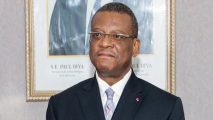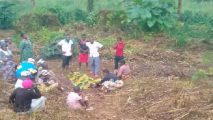Categories
Recent Posts
- Football: Panthère du Ndé Wins Cameroon Cup 2025
- Fifa brings in new £45 ticket for 2026 World Cup
- President Sisiku Ayuk Tabe, top aides to appear before the Supreme Court
- Pressure mounts on Biya as speculation grows over possible replacement of Ngute
- 2025 is the year when Biya’s long rule finally lost its last convincing justification
Archives
- December 2025
- November 2025
- October 2025
- September 2025
- August 2025
- July 2025
- June 2025
- May 2025
- April 2025
- March 2025
- February 2025
- January 2025
- December 2024
- November 2024
- October 2024
- September 2024
- August 2024
- July 2024
- June 2024
- May 2024
- April 2024
- March 2024
- February 2024
- January 2024
- December 2023
- November 2023
- October 2023
- September 2023
- August 2023
- July 2023
- June 2023
- May 2023
- April 2023
- March 2023
- February 2023
- January 2023
- December 2022
- November 2022
- October 2022
- September 2022
- August 2022
- July 2022
- June 2022
- May 2022
- April 2022
- March 2022
- February 2022
- January 2022
- December 2021
- November 2021
- October 2021
- September 2021
- August 2021
- July 2021
- June 2021
- May 2021
- April 2021
- March 2021
- February 2021
- January 2021
- December 2020
- November 2020
- October 2020
- September 2020
- August 2020
- July 2020
- June 2020
- May 2020
- April 2020
- March 2020
- February 2020
- January 2020
- December 2019
- November 2019
- October 2019
- September 2019
- August 2019
- July 2019
- June 2019
- May 2019
- April 2019
- March 2019
- February 2019
- January 2019
- December 2018
- November 2018
- October 2018
- September 2018
- August 2018
- July 2018
- June 2018
- May 2018
- April 2018
- March 2018
- February 2018
- January 2018
- December 2017
- November 2017
- October 2017
- September 2017
- August 2017
- July 2017
- June 2017
- May 2017
- April 2017
- March 2017
- February 2017
- January 2017
- December 2016
- November 2016
- October 2016
- September 2016
- August 2016
- July 2016
- June 2016
Featured
 2025 is the year when Biya’s long rule finally lost its last convincing justification
2025 is the year when Biya’s long rule finally lost its last convincing justification  Young Cameroonians: Build social capital to succeed
Young Cameroonians: Build social capital to succeed  Eulogy for HRH Nfor Professor Teddy Ako of Ossing
Eulogy for HRH Nfor Professor Teddy Ako of Ossing  Will Fr. Paul Verdzekov recognize the refurbished and rededicated Cathedral in Bamenda were he to return today?
Will Fr. Paul Verdzekov recognize the refurbished and rededicated Cathedral in Bamenda were he to return today?  Cameroon apparently under a de facto federalism
Cameroon apparently under a de facto federalism
Most Commented Posts
 4 Anglophone detainees killed in Yaounde
4 Anglophone detainees killed in Yaounde
18 comments Chantal Biya says she will return to Cameroon if General Ivo Yenwo, Martin Belinga Eboutou and Ferdinand Ngoh Ngoh are sacked
Chantal Biya says she will return to Cameroon if General Ivo Yenwo, Martin Belinga Eboutou and Ferdinand Ngoh Ngoh are sacked
13 comments The Anglophone Problem – When Facts don’t Lie
The Anglophone Problem – When Facts don’t Lie
12 comments Anglophone Nationalism: Barrister Eyambe says “hidden plans are at work”
Anglophone Nationalism: Barrister Eyambe says “hidden plans are at work”
12 comments Largest wave of arrest by BIR in Bamenda
Largest wave of arrest by BIR in Bamenda
10 comments
Latest Tweets
Featured
-

Football: Panthère du Ndé Wins Cameroon Cup 2025
-

Fifa brings in new £45 ticket for 2026 World Cup
-

President Sisiku Ayuk Tabe, top aides to appear before the Supreme Court
-

Pressure mounts on Biya as speculation grows over possible replacement of Ngute
-

2025 is the year when Biya’s long rule finally lost its last convincing justification
-

Armed Mbororo tribesmen killed 8 in Southern Cameroons’ new war
-

Southern Cameroons Crisis: Atanga Nji Boys abduct 8 people en route to Kumbo
© Cameroon Concord News 2025
28, March 2017
Anglophone Crisis: Counting the cost 0
It is only five months since the unfortunate drama between the government and the Anglophone minority has been playing out and the adverse consequences are already far-reaching. When it all started, not many people thought it would last for more than a week, but five months after, the government is yet to reestablish its authority in the English-speaking part of Cameroon. On the surface, it looks like a simple game, but when you scratch beyond the surface, the true cost of the conflict hits you like a ton of bricks. Government authority has been challenged in the Anglophone region and in places like Akwaya, one of the most impoverished sub-divisions of the country, the Nigerian flag is joyously flying above many government buildings. Administrative officers in Akwaya have been fired by the people and government offices have either been burnt or come under attack by irate youths. The people of Akwaya are clearly demonstrating their anger against a government they claim has neglected them for more than five decades and, to make matters worse, it has arrested one of their prominent sons, Justice Paul Ayah.
In Eyumojock, the youths are clearly advising government officials of the end of their era. Last Friday, members of the ruling party were attacked by youths who hold that the ruling party has overstayed its welcome in West Cameroon following the outlawing of the Consortium. Many of the party officials had to flee the ceremonial grounds where they had planned to celebrate the thirty-second anniversary of their party, living behind their cars when stone-throwing youths invaded the venue of the event. From the actions playing out in West Cameroon, it is obvious that the ruling party has died a natural death. Many Anglophones are already asking ruling party parliamentarians in the Anglophone zone to start looking for new jobs as they will have to face the wrath of West Cameroonians in the 2018 parliamentary elections.
However, it is the killing of many innocent Anglophones during the strikes and demonstrations that is hard to swallow. Many Anglophones were brought down by the bullets of the forces of law and order and many more have died in detention either due to poor detention conditions or torture by some overzealous elements who erroneously hold that the country belongs to them and any attempt to challenge their God-given right must meet with a stiff response. This is even one of the issues that is making genuine dialogue almost impossible, as the government cannot confidently account for all those who have been arrested. Information from government sources which have elected to be anonymous alleges that some of those arrested have been tortured to death and they claim to know where these victims have been buried in mass graves.
They have expressed their willingness to expose some of these human rights abuses when the right time comes – that is, if it will ever come. Some terrifying videos and pictures are already online and this explains, in part, why the government has rolled back the Anglophone region into the Dark Ages by disconnecting the Internet. Stories of gruesome arrests have been making the rounds, alleging that some people have been arrested while alone and nobody is aware of their whereabouts. It will be hard to actually account for all those who have disappeared and many government officials have been working hard and long to ensure that the issue of those who have died or disappeared never gets included in the agenda of any dialogue whenever both parties agree to meet to thrash out their differences regarding the disaster that is still playing out in Cameroon; a disaster that has caused the country’s economy to be caught in a downward spiral.
However, the Anglophone minority holds that it has incontrovertible evidence in that regard and that those responsible for such abuses will be taken to the International Criminal Court where they could spend a long time reflecting on their atrocities; an idea that is causing many government officials to lose sleep and appetite. Their determination to take government officials to The Hague is being supported by prominent African and International human rights lawyers who are keeping a close eye on the situation and are documenting abuses committed by both sides.
Besides the killings that many Anglophones consider as worrisome, the country’s image has taken a serious beating. Cameroon has always been considered around the world as a peaceful country in a tough neighborhood. While many countries in the Central African sub-region have known either a civil war or a Coup d’état, Cameroon has, over the last fifty-six years, been enjoying some relative peace. Though many consider the peace as unsettling because of the lack of genuine human rights and freedoms, the country’s government has successfully packaged the country as an oasis of peace in a desert of chaos, an image that has been bought by many investors and diplomats across the globe. But this image has suddenly vanished following the brutality government troops unleashed on Anglophone lawyers when they took to the streets to call for better working conditions and a return to a federal system of government that will guarantee the interest of the Anglophone minority in Cameroon. Today, Barrister Felix Agbor Balla, Dr. Fontem Neba and Justice Paul Ayah have been robbed of their freedom for calling for a federal system of government; a request that has caused the country’s government to lose sleep and control of itself. Scenes like these are hurting the country’s image and scaring investors who are averse to uncertainty.
The country’s economy that was already on the ropes prior to the advent of the Anglophone crisis, has taken a dangerous nosedive. Poor policies and mismanagement over the last decades have sapped the country’s economy of its vitality. Corruption and embezzlement have caused many state-owned enterprises to collapse and, currently, many former ministers and corporate executives are languishing in jail for robbing the people of their scarce resources. But this situation has been made worse by the crisis, especially in the English-speaking part of the country, where ghost towns are respected to the letter and the disconnection of the Internet has caused many start-ups to either shut down operations or relocate to where they can do business, albeit at exorbitant costs.
Banks and money transfer agencies are struggling to stay afloat, but the longer the Internet disconnection persists, the greater their pain. To cushion the impact of the government’s ill-informed decision to disconnect the Internet, a tool that is vital for their operation, financial institutions and software companies have laid off many employees, pushing up the country’s unemployment rate to levels never witnessed before. The situation is very disturbing and it has already served as a death sentence to many small- and medium-sized enterprises. With students not going to school and many Cameroonians facing an uncertain future, the country’s crime rate is gradually heading for the sky. In a country where there is no welfare and universal health coverage, death toll from preventable and curable diseases will surely reach alarming rates, especially in West Cameroon where many people have lost their jobs and sources of revenue.Though members of the Diaspora are reaching out financially to their family members for medical reasons, the country’s medical facilities still leave much to be desired. They are, at best, consultation clinics and, at worst,mortuaries for many Cameroonians who lack the resources to seek better healthcare abroad.
Also, one of the major costs that will be borne by the country as a result of this conflict is the academic year that has been messed up by the striking Anglophones. From the look of things, the 2016-2017 academic year is over and it is likely that end-of-year examinations will not take place. The entire Anglophone educational sub-system is in total chaos and pulling the system out of this pretty mess will take a lot of hard work and determination. Schools have been closed for more than four months. The strike is still in effect and there is no end in sight, as the government is not willing to make any concessions and the Diaspora that is running the show remotely is not yielding an inch of its acquired territory to a government that is wont to speaking from both sides of its mouth.
Though the country’s officials have rolled out plans to make up for the lost time, it will be challenging to play catch-up in an environment of conflict and mistrust. Students of the Anglophone educational sub-system and their parents must have to pray long and hard for this unfortunate situation to be laid to rest. Staying at home could be boring, but losing an entire academic year could be really unsettling, especially as many parents are out of work and the economy is in a tailspin.
If this unfortunate situation has to be a thing of the past, both the government and striking Anglophones have to make big concessions. The government has to listen to the people who have clearly stated that for any talks to take place, their leaders, the only people mandated to represent them in any discussions, and fellow Anglophones who are currently being detained in Yaounde must be released. The Internet, a great research tool,must be restored and the arbitrary arrests that have become a daily occurrence must also stop. They insist that federalism must be on the agenda of any discussion with the government. The striking Anglophones are calling for a better Anglophone educational sub-system and an Anglophone section at the Supreme Court.
The government, for its part, has expressed its willingness to dialogue, but insists that the form of the state is not up for discussion. It considers those in jail as terrorists who must be dealt with according to the law. This appears to be a sticking point and neither the government nor the striking Anglophones are willing to make concessions. As both parties stick to their guns, they must understand that the country is suffering as a result of the conflict. They must remember that students want to go to school, but they want to attend classes in a demilitarized and learning-friendly environment. Similarly, in this battle of the wills and egos, both parties must bear in mind that the true winner will be Cameroon, as a better country will emerge from the ashes of the old country that had been designed without the people’s interest at heart.
Dr. Joachim Arrey
Contributing Editor
Cameroon Concord News Group
About the Author: The author of this piece is a keen observer of Cameroon’s political and economic landscape. He has published extensively on the country’s political and economic development, especially in the early 90s when the wind of change was blowing across the continent. He has served as a translator, technical writer, journalist and editor for several international organizations and corporations across the globe. He studied communication at the University of Leicester in the United Kingdom and technical writing in George Brown College, Toronto, Canada. He is also a trained translator and holds a Ph.D.